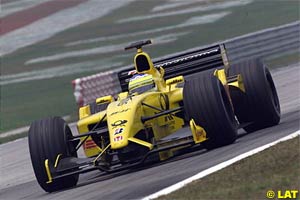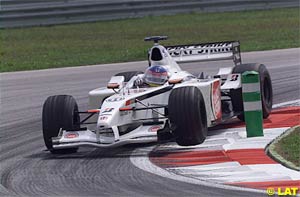
Atlas F1 Senior Writer
Japanese engine supplier Honda returned to Formula One in 2000 after a seven-year absence. After 71 Grand Prix wins and six Constructors' Championships, few doubted that Honda would return to the top of the sport. Yet after two seasons with BAR and one with Jordan, the Japanese giant has failed to live up to the expectations. Karl Ludvigsen tries to shed some light on the reasons why Honda is not winning
I also thought Honda would get its act together for 2002. The respected Formula One engine builder has clearly been struggling since its return to Grand Prix racing in 2000 with BAR. I don't want to unduly embarrass my friends at Honda, but I'm sure they won't mind if I quote what they said when they announced their plans to return to the Grand Prix wars:
"As a result of these studies, it was decided that an ideal partnership could be created by having BAR, a brand new Grand Prix team, assume team management responsibilities, while Honda concentrated on the pure technological side in developing F1 machines for the next century. Through this joint project, Honda will be entering its third era of F1 participation, more than seven years since its last participation in its second era, (1983-1992) and over 35 years after the very first race that began the first era (1964-1968).
"Honda believes this project will nurture the capabilities of its engineering and develop advanced technologies, including those for chassis (design and construction) while meeting the expectations of its motorsport fans around the world. This time, Honda's F1 challenge will not be limited to simply supplying engines, but will be a more comprehensive effort, including total machine development, in conjunction with BAR."
The high hopes expressed in the launch release quoted above have obviously not been realized. Honda seems to have been wrong-footed by the pace of development set by its rivals. "I wouldn't say we were surprised by Formula One," Shoichi Tanaka, president of Honda Racing Development, said at the beginning of this season, "but we realized that all the car manufacturers were more serious that we thought - and it is no surprise they are. Maybe in the past we were the only ones who were so serious about Formula One."
During the 2001 season Tanaka-san had this to say: "We have been learning for the past two years, and it has been a bitter lesson. We must work harder than the other top teams if we are to succeed." So far this year there is little evidence that this effort has been expended or, if it has been, that it is achieving results. If one or the other of Jordan and BAR were doing well, no fingers could be pointed at the engine. But when both are floundering it's pretty clear that a lack of power - the right kind of power - is a shared shortcoming.
If this is what Honda is still doing - and I suspect that it is - it's not good enough in today's competitive circumstances. We can be certain that this is being pointed out in Japan by those who are all too aware that Toyota, starting virtually from scratch and with its own car as well as engine, is making Honda look pretty bad. To be sure, Toyota has done it with a multinational team of engineers at its Cologne base. Complaints from Japan are that there aren't enough Japanese involved with the Toyota effort. Certainly Toyota is less worried about using its Formula One entry to train engineers than it is in doing well - which it has done so far to an astonishing degree. Either Honda will step up to a more serious and aggressive approach to its engine building, to match and surpass Toyota, or it will withdraw ignominiously from Formula One. My guess is that the latter is the more likely.
Such a withdrawal shouldn't be for a while yet. Honda is contracted to supply Jordan through 2003 - with options for two more years - and BAR through 2004. We haven't heard much lately about the ambitious plans for Honda to help BAR in technical areas other than engines; we can be confident that David Richards will be taking a close look at that aspect of their relationship. After the race in Malaysia Richards said that his team has it all to do this year: "Both drivers and all the team put in an enormous effort over the weekend, but our problems were there for everyone to see. Despite the fact that Jacques finished 8th, we very clearly have an enormous mountain to climb and we won't achieve our goals without some radical changes." Richards will certainly be hoping for a stronger contribution from his Japanese partners.
With good reason, we think of Japanese firms in general and Honda in particular as behaving honorably and living up to their commitments. But I seem to recall that after a successful 1987 season, Honda left Williams in the proverbial lurch from an engine standpoint. There's every reason to suspect that it may just do that again - contract or no contract - if the rest of 2002 doesn't bring something more respectable in the way of results. BAR and Jordan, I think that's a fair warning. And it's a warning to you as well, Tanaka-san.
Well, that's a wrap. I've given up on Honda. They can't say I've chucked in my cards prematurely. I picked Jordan-Honda, with Renault, as one of the teams most likely to harass the front-runners this year. I based this on the fact that Jordan's budget was lightened from 2001 by not having to pay for engines, and that as a result Eddie Jordan would be able to invest more in his cars and their all-important computer simulation and testing.
 He'd also brought the highly regarded Eghbal Hamidy on board - a relationship that is already on the rocks. As I expected, as well, by changing both his drivers Jordan did his team no favors, destroying any year-to-year continuity of development and testing.
He'd also brought the highly regarded Eghbal Hamidy on board - a relationship that is already on the rocks. As I expected, as well, by changing both his drivers Jordan did his team no favors, destroying any year-to-year continuity of development and testing.
"Since March of 1998, Honda has been studying various F1 racing re-entry factors, including team structure, timing of participation and technical evaluation of prototype machines, while also considering both the current and future business environment.
Those previous eras established a strong reputation for Honda. The first effort in the 1960s, when Soichiro Honda was still with us, was notable mainly for the determination that Honda showed in designing and building its own cars as well as engines. In the second era, Honda concentrated on engines with outstanding results for both Williams and McLaren. The last Honda win was in a McLaren driven by Gerhard Berger in Australia in 1992. Although not dominant that season, Honda left Formula One with its fine reputation still intact.
 Traditionally, Honda has staffed its racing-engine operation with engineers from its mainstream product-design cadres. They rotate in and out of the racing activity to give them added skills and insights. Beneficial though this has been to Honda's vehicle development, it has sometimes short-changed the racing effort. Engineers like Osamu Goto and Eiji Taguchi, who have made important contributions to Honda's racing effort, have been promoted up and out of the motorsports programs. The same applies to senior Honda engineers who have gone on to run the company.
Traditionally, Honda has staffed its racing-engine operation with engineers from its mainstream product-design cadres. They rotate in and out of the racing activity to give them added skills and insights. Beneficial though this has been to Honda's vehicle development, it has sometimes short-changed the racing effort. Engineers like Osamu Goto and Eiji Taguchi, who have made important contributions to Honda's racing effort, have been promoted up and out of the motorsports programs. The same applies to senior Honda engineers who have gone on to run the company.
Please Contact Us for permission to republish this or any other material from Atlas F1.
|
Volume 8, Issue 12
Atlas F1 Exclusive
Stoddart's Roller Coaster Ride
The Man Who Follows the Money
In the Spotlight: Tyre War, Tyre War
Malaysian GP Review
The Malaysian GP Review
Technical Review: Malaysian GP
Commentary
The Setting Sun
Reflections from Sepang
Seconds Out
Stats
Qualifying Differentials
SuperStats
Charts Center
Columns
Season Strokes
Elsewhere in Racing
The Grapevine
> Homepage |